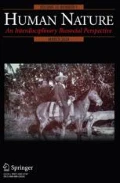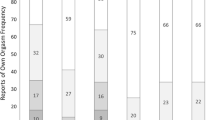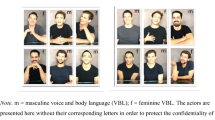Abstract
Heroism is apparently nonadaptive in Darwinian terms, so why does it exist at all? Risk-taking and heroic behavior are predominantly male tendencies, and literature and legend reflect this. This study explores the possibility that heroism persists in many human cultures owing to a female preference for risk-prone rather than risk-averse males as sexual partners, and it suggests that such a preference may be exploited as a male mating strategy. It also attempts to quantify the relative influences of altruism and bravery in the evolution of heroism. Our study found that females do prefer risk-prone brave males to risk-averse non-brave males, and that men are aware of this preference. Bravery in a male was shown to be the stronger factor influencing female choice of short-term partners, long-term partners, and male friends, with altruism playing a lesser part in their choice. Altruism was deemed important in long-term relationships and friendships, but for short-term liaisons, non-altruists were preferred to altruists. Heroism may therefore have evolved owing to a female preference for brave, risk-prone males because risk-taking acts as an honest cue for "good genes." Altruism was judged to be a less influential factor in the evolution of heroism than bravery and a demonstrated willingness to take risks.
Similar content being viewed by others
References
Alcock, J. 1993 Animal Behavior: An Evolutionary Approach. Sinauer Associates, Sunderland, Massachusetts.
Bruce, A. C., and J. E. V. Johnson 1994 Male and Female Betting Behaviour: New Perspectives. Journal of Gambling Studies 10:183–198.
Cashdan, E. 1996 Women’s Mating Strategies. Evolutionary Anthropology 5:134–143.
Chagnon, N. A. 1992 Yanomamo: The Last Days of Eden. Harcourt Brace Javanovich, New York and London.
Clift, S. M., J. C. Wilkins, and E. A. Davidson 1993 Impulsiveness, Venturesomeness and Sexual Risk-taking among Heterosexual GUM Clinic Attenders. Personality and Individual Differences 15:403–410.
Draper, P., and H. Harpending 1982 Father Absence and Reproductive Strategy: An Evolutionary Perspective. Journal of Anthropological Research 38:255–273.
Flisher, A. J., C. F. Ziervogel, D. O. Charlton, P. H. Leger, and B. A. Robertson 1993 Risk-Taking Behavior of Cape Peninsula High-School Students: Road-Related Behaviour. South African Medical Journal 83:486–490.
Harre, N., J. Field, and B. Kirkwood 1996 Gender Differences and Areas of Common Concern in the Driving Behaviors and Attitudes of Adolescents. Journal of Safety Research 27:163–173.
Hawkes, K. 1991 Showing Off: Tests of an Hypothesis about Men’s Foraging Goals. Ethology and Sociobiology 2:29–54.
Hill, K., and H. Kaplan 1988 Tradeoffs in Male and Female Reproductive Strategies among Ache Foragers: Parts 1 and 2. In Human Reproductive Effort, L. Betzig, M. Borgerhoff Mulder, and P. Turke, eds. Pp. 277–306. Cambridge: Cambridge University Press.
Howland, J., R. Hingson, T. W. Mangione, and N. Bell 1996 Why Are Most Drowning Victims Men? Sex Differences in Aquatic Skills Behaviors. American Journal of Public Health 86:93–96.
Poppen, P. J. 1995 Gender and Patterns of Sexual Risk Taking in College Students. Sex Roles 32:545–555.
Powell, M., and D. Ansic 1997 Gender Differences in Risk Behaviour in Financial Decision-making: An Experimental Analysis. Journal of Economic Psychology 18:605–628.
Stearns, S. C. 1989 Demonstrating Unselfishness: They Haven’t Done It Yet. Behavioral and Brain Science 12:723.
Trivers, R. L. 1971 The Evolution of Reciprocal Altruism. Quarterly Review of Biology 46:35–57.
Tyler, J., and C. Lichtenstein 1997 Risk, Protective, AOD Knowledge, Attitude, and AOD Behavior: Factors Associated with Characteristics of High-Risk Youth. Evaluation and Program Planning 20:27–45.
Wilson, M., M. Daly, S. Gordon, and A. Pratt 1996 Sex Differences in Valuations of the Environment? Population and Environment 18:143–159.
Zahavi, A., and A. Zahavi 1997 The Handicap Principle: A Missing Piece of Darwin’s Puzzle. Oxford: Oxford University Press.
Author information
Authors and Affiliations
Corresponding author
Additional information
Susan Kelly has a BSc in Psychology and an MSc in Evolutionary Psychology from the University of Liverpool.
Robin Dunbar leads the Evolutionary Psychology Research Group at the University of Liverpool, england. His research interests focus on the trade-offs and contingencies that influence the reproductive decisions in ungulates, primates and humans and on the evolution of mammalian social systems.
Rights and permissions
About this article
Cite this article
Kelly, S., Dunbar, R.I.M. Who dares, wins. Hum Nat 12, 89–105 (2001). https://doi.org/10.1007/s12110-001-1018-6
Received:
Revised:
Issue Date:
DOI: https://doi.org/10.1007/s12110-001-1018-6




